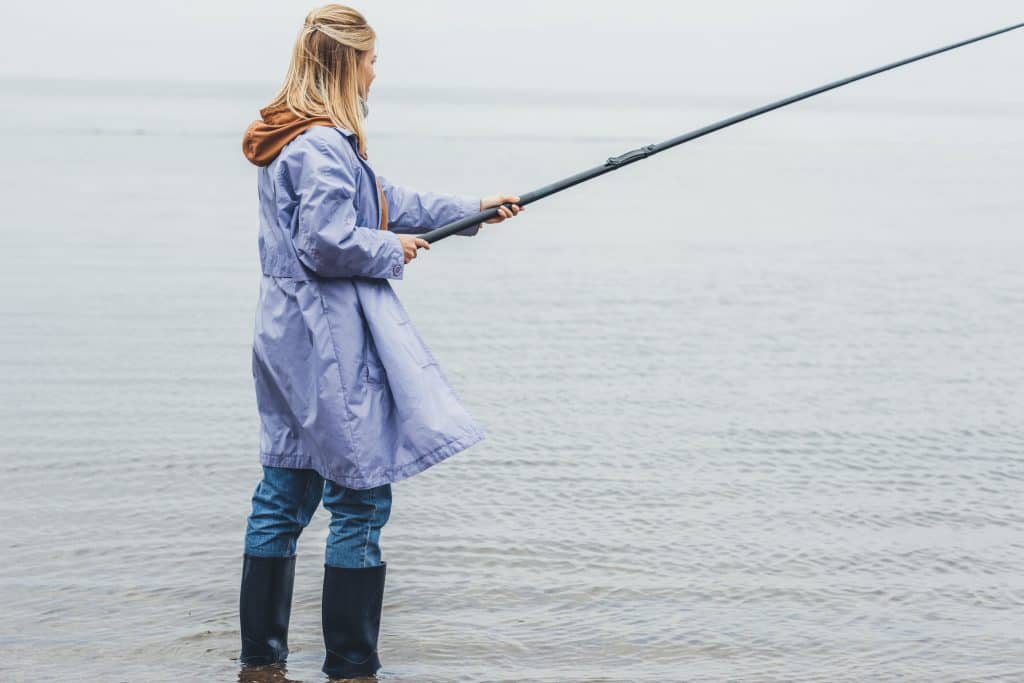
While planning my next fishing trip, I checked the forecast and saw that it called for rain. Many would scrap the entire fishing trip; however, some may ask if its good to fish in the rain. I’ve gathered some information on the subject and shared it below!
So, is fishing
The weather can throw a wrench into anyone’s fishing plans. Below we are going to discuss certain barometric and weather conditions, the effects rain can have on the fishing conditions, rain in different seasons of the year, some “rain fishing” tips to help you succeed, and the safety precautions you should take before going out on the water in a rainstorm.
Effects of Rain on Fishing
I grew up fishing on some of the mountain streams in Montana with my brother and grandfather. While I was not one of the best fishermen out there, I did get the chance to learn a lot about the different conditions and techniques for fishing.
There would be multiple times in the
Whenever I would notice that rain was about to start falling, I would always begin to tell them that we should call it quits on our fishing trip, but my brother and grandfather would always remind me to wait. They would always say, “The fishing is only just starting to get good.”
Most times the three of us would fish through the beginning of a rainstorm until well past the end. And often enough, I would notice the bites would begin to increase at the beginning and end of the storms.
Curiously I asked my brother and grandfather what was causing this sudden change in our luck. They explained something to me that had not even passed through my young mind yet.
They explained to me how when the rain would start falling, bugs would get knocked from the sky onto the water’s surface and the fish would rise to eat them. As a fish would rise to the surface to eat a tasty bug, they would see my line and go for the worm at the other end instead.
Fish may bite more at the beginning and end of a rainstorm.
This is consistent with what we will learn below about fishing and the barometric pressure. As the barometric pressure begins to fall, the larger fish rise to the surface or shallower water to hunt for the smaller fish eating the bugs on the surface, or they themselves will stop to eat some bugs.
Similarly, at the end of the storm, the fishing would increase as well. We can attribute this to the insects flying lower and closer to the water after the storm, continuing to bring the fish to the surface.
Keep In Mind:
Light rain brings bugs closer to the water, and fish closer to the surface.
As a rainstorm passes through, another thing calling the fish closer to the surface of the water is the new nutrients that are being washed into the water. Plants that fall into the water due to the rain make for great snacks for the rising fish.
To answer the title question, think I we can agree that fishing conditions tend to be very good both before and after it rains.
However, if we are trying to decide when is the absolute best time to be out on the water fishing, that would depend on the species of fish you are hoping to catch, the tactic with which you will be fishing, and the bait you are planning to use as well as the weather conditions.
Fishing and the Barometric Pressure
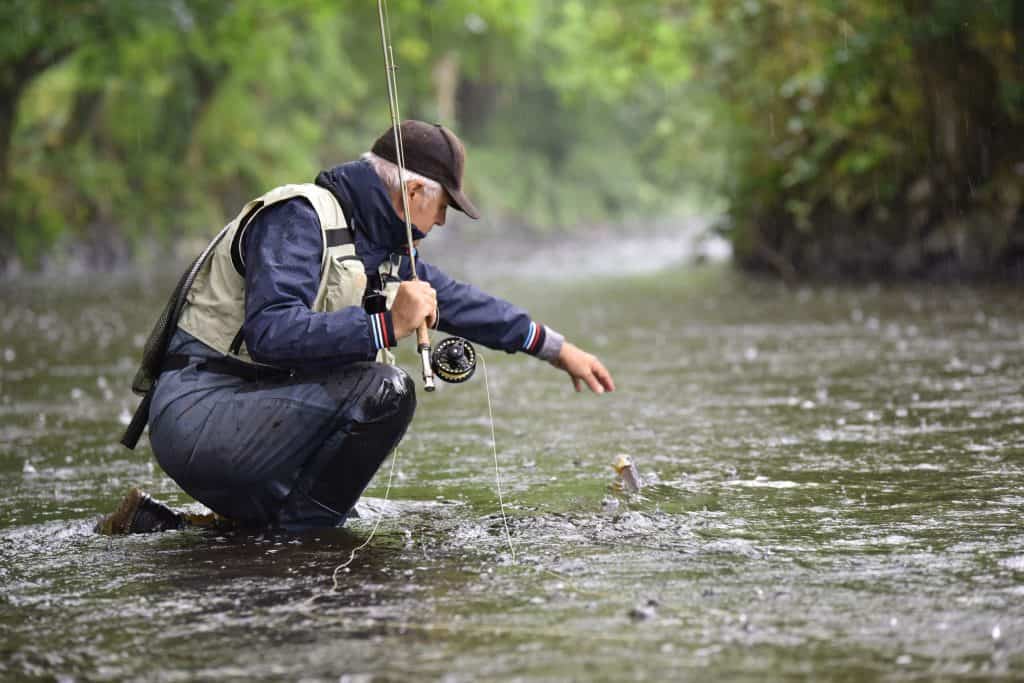
Now, let’s take a moment to learn more about how barometric pressure can have an effect on your fishing trip. Just as you and I would begin to act differently if we saw the weather changing, fish do the same with the changes in the barometric pressure.
Since the barometric pressure is constantly changing so are the fishes’ behavior.
First of all, we will discuss the effects the changes in barometric pressure have on the weather.
When describing the barometric pressure, people often use the two words “high” and “low.” When someone says that there is a high-pressure system moving in, we often associate this with sunnier, clearer weather. We associate the opposite with a low-pressure system (cold weather, stormy).
Skipping the fish anatomy lesson, we can discuss why fish are so affected by the changes in barometric pressure.
The simple explanation is a fish’s “air bladder,” which is used to help fish move up and down in the water column.
As the air pressure changes, the fish feel the changes in their air bladders and move throughout the water accordingly to find the most comfortable place.
The larger the fish, the larger the air bladder and the more likely they are to be affected by the changes in barometric pressure.
So the reason you haven’t caught that big fish yet may simply lay in the fact that the barometric pressure was against you (we do not need to discuss any other reason for that).
Fish react to even the subtlest changes in barometric pressure.
The effects of a low-pressure system and the inevitably accompanying cold weather tends to make fish bite more for a short period of time and then to disappear. Simply because the water is getting colder.
When there is a low-pressure system setting in, larger fish may be more likely to draw closer to the surface.
In regards to fishing based on the barometric pressure, the best time to go fishing is when the barometric pressure has been consistent (not too hot, not too cold) for several days.
However, since this article is about if fishing is good after rain, we are not looking at a time when there is consistent barometric pressure.
Sudden changes in the barometric pressure (such as the end of a rainstorm, or even the beginning of said storm) can cause fish to react quickly and to differ slightly from their normal behavior.
The best time to go fishing is when the barometric pressure has been consistent for several days.
Below I have provided a chart that describes how the changes in barometric pressure will af
| Barometer Reading | Common Weather | How the Fish React |
| High Pressure | Sunny | Fish search for shade and cover |
| Rising Pressure | Slight cloud cover | Bites become more consistent |
| Neutral Pressure | Fair Weather | Normal feeding |
| Falling Pressure | Chance of Rain | “Best” time to fish |
| Lower Pressure | Raining | Small fish head to the shallows, big fish start to hunt |
| Low Pressure | Consistent Rain, water levels rise | Fish become less active |
If you are hoping to catch a large fish, then you should consider going fishing at the beginning of a storm simply because this is the time when the larger fish start hunting the smaller fish that are seeking shelter in the shallower waters.
If you are interested in learning more about fishing and the barometric pressure, check out my article “Is Fishing Better in High or Low Pressure?“
Keep on reading to learn more about fishing in different seasons and some tips to be the most successful fisherman in the rain.
Rain, Fishing, and the Different Seasons
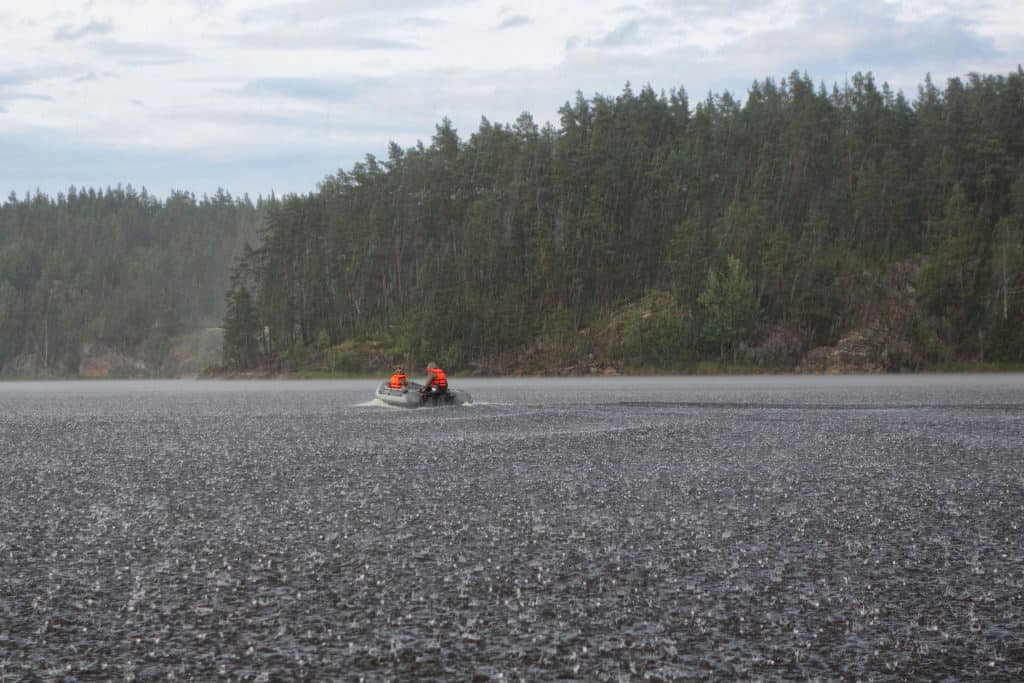
While fishing in the rain appears to be the perfect fishing scenario, the fishing conditions can heavily depend on the time of year.
A rainstorm can be exactly what you needed to make your fishing trip successful, or the rain could put an early end to your fishing trip.
At the beginning of Spring, fishermen are eager to begin fishing their favorite lakes, rivers, and streams once again. The air and water are still cool, and fish are beginning to grow more active.
However, while the air and water are still at a chillier level, a rainstorm would quite literally put a damper on your fishing excursion.
This is due to the fact that the cooler water becomes even cooler when the rain sets in. Fish are then going to bite less and begin to seek for warmer areas.
Fish will often move from normal feeding grounds to seek warmer waters.
On the other hand, on a warm day of summer when the sun has been shining for a few days already, a sudden rainfall can re-invigorate any of the fish that have become sluggish from the heat.
In the table above we saw that in the sunnier weather, fish are going to seek shade. The shade where the fish are hiding tends to be in hard to cast to places making it harder for you to catch a fish. The new rain might even bring out some of the big fish that you have been searching for.
Should You Go Fishing in the Rain?
Fishing in the rain creates a few new challenges that fishing in clearer weather does not.
There are a few factors that decide whether or not you should go fishing in the rain. These factors are:
- The intensity of the rain
- The temperature outside
- Your visibility of the water
and…
4. Your clothing and protection
Below let’s discuss each of these four topics a little more in depth.
#1 The Intensity of the Rain
Ultimately the intensity of the rain determines whether or not you should continue fishing.
A light or even medium rainstorm can create some prime fishing conditions. Find a place where you can remain warm and continue casting.
However, a heavy rainstorm with solid downpour might just cause more problems and create more danger than continuing to fish is worth.
If the rain becomes too heavy to continue, you should take shelter indoors (or inside your vehicle) until the storm begins to lighten up. In the event that the storm does not begin to lighten, you might need to call an end to your fishing trip for the day and pick up where you left off at another time.
NEVER CONTINUE FISHING IN AN ELECTRICAL/THUNDER STORM!
Be cautious when fishing during a rainstorm to watch and listen for signs of lightning and thunder. You should not continue fishing if an electrical storm approaches and you should seek the proper cover as quickly as possible.
#2 The Temperature Outside
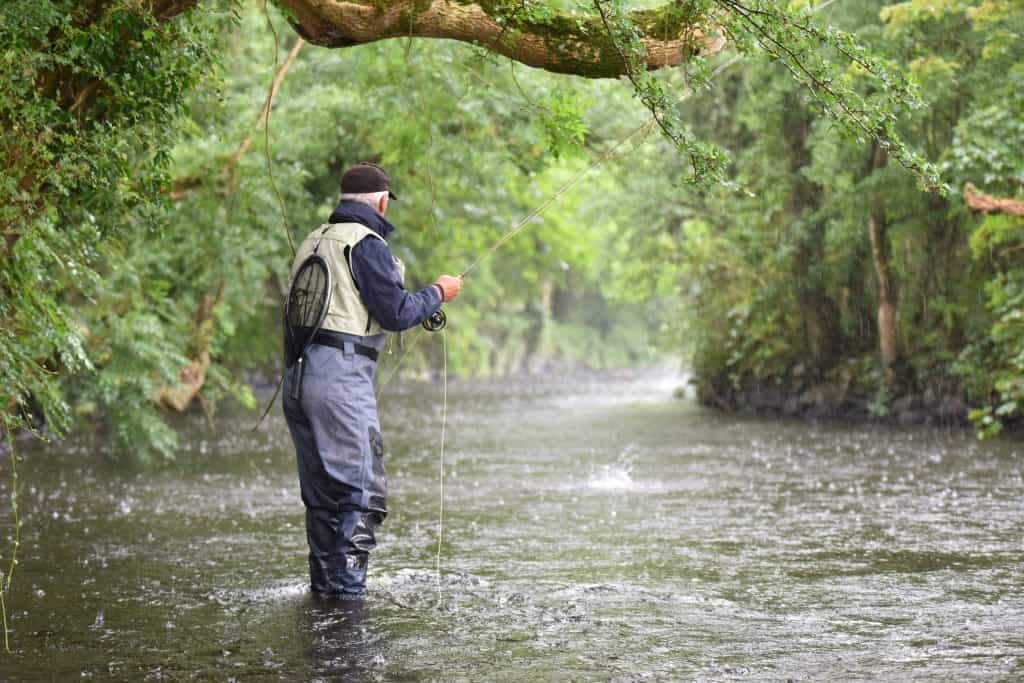
Many of us have experienced and know that time when the weather is warm enough to enjoy being outdoors but still rain begins falling.
On the other side, we also know that feeling when the weather was already cold outside and the incoming rain just makes it too unbearably cold to remain outside.
If the weather is warm enough for you to continue fishing comfortably, by all means, fish on!
However, if the temperature drops too low, you will be uncomfortable and putting yourself at risk. The fish are likely to search for warmer waters anyways. Do not waste your time in the cold and rain searching for the fish that just are not there.
#3 Your Visibility of the Water
One of the great benefits of fishing in a rainstorm is that the falling rain masks your line from the fishes’ view.
However, while the rain is impeding the fishes’ visibility the rain is also affecting yours. If you are no longer able to see to cast correctly and efficiently, do not attempt to push the limits of safety.
One of our number one concerns while fishing in or near any body of water should always be the safety of yourself and others.
Rainstorms can cause flash floods or other problems that can create a serious danger for any nearby fishermen.
Our number one concern when out on the water should always be safety.
Since being able to see danger is the best way to avoid it, if the visibility while on the water becomes too obstructed you will not have that same ability to remain safe.
Always be cautious and if you can no longer safely see to assess the water’s current situation make the smart decision and end your fishing trip early.
#4 Your Clothing and Protection
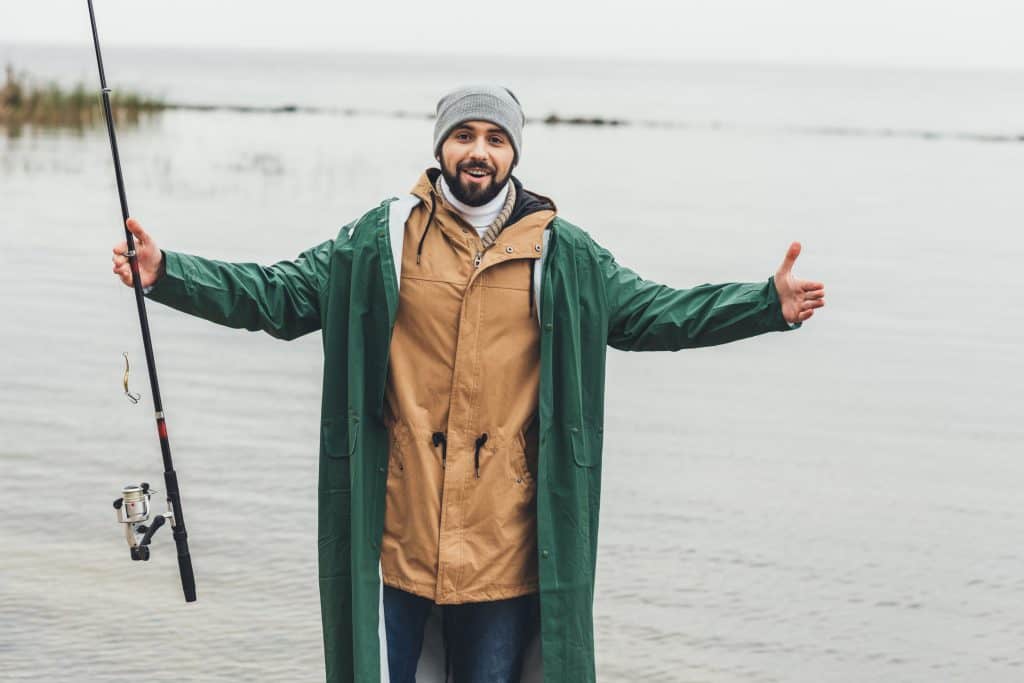
Make sure that you are properly dressed and have adequate protection nearby before deciding to continue on with your fishing trip.
In Montana, we often joke that you can experience all four seasons in the span of an hour. As fun as it is to say, there is very much truth to that statement.
Since the weather is constantly changing we tend to dress and pack for all four seasons no matter where we go, likewise, you should be aware of the weather and dress accordingly.
Be prepared for any weather circumstances that could arise while fishing.
Dress in clothes that will not allow water to sit directly against your skin. If the temperature drops too low and you are wearing wet clothes, mixing these two factors could lead to hypothermia.
Also, make sure you have an extra coat or jacket in the event that the weather gets too cold for your normal fishing attire.
While what you wear fishing may not seem to be of extreme importance, if you get too cold, you may not be able to wait out the end of the storm and you will have to cut your fishing trip short simply due to bad planning.
As for finding the proper protection, some electrical storms or just heavy rainfall can move in quickly and unexpectedly. Make sure you have some form of shelter or protection close by in the event that you can no longer remain outdoors.
This shelter can come in the form of a car, tree cover, tent, or nearby building. Just be cautious and aware.
“Rain Fishing” Tips
As I mentioned above, fishing in the rain creates new challenges that fishing in clearer weather does not. Because of this rain fishing takes some different thinking and tactics to fish effectively.
To help you overcome these new challenges, I gathered the top 8 things to do or consider while fishing in the rain.
#1 Fish Toward the Top
Most the time we are attempting to catch fish from all levels of the water: bottom, middle, top.
However, when falling rain is causing surface disturbances and bring bugs closer to the water’s surface, this is the perfect time to begin focusing your casts towards the top of the water.
Rain causes the perfect opportunity to do some surface fishing.
Using top lures in the rain can be more effective than at other times. Fish are rising to the surface to eat the bugs and vegetation there and your top lure appears to be just another tasty snack waiting above.
Take advantage of the fishes’ new location and their obscured visibility to catch the fish nearing the surface waters.
#2 Fish Faster
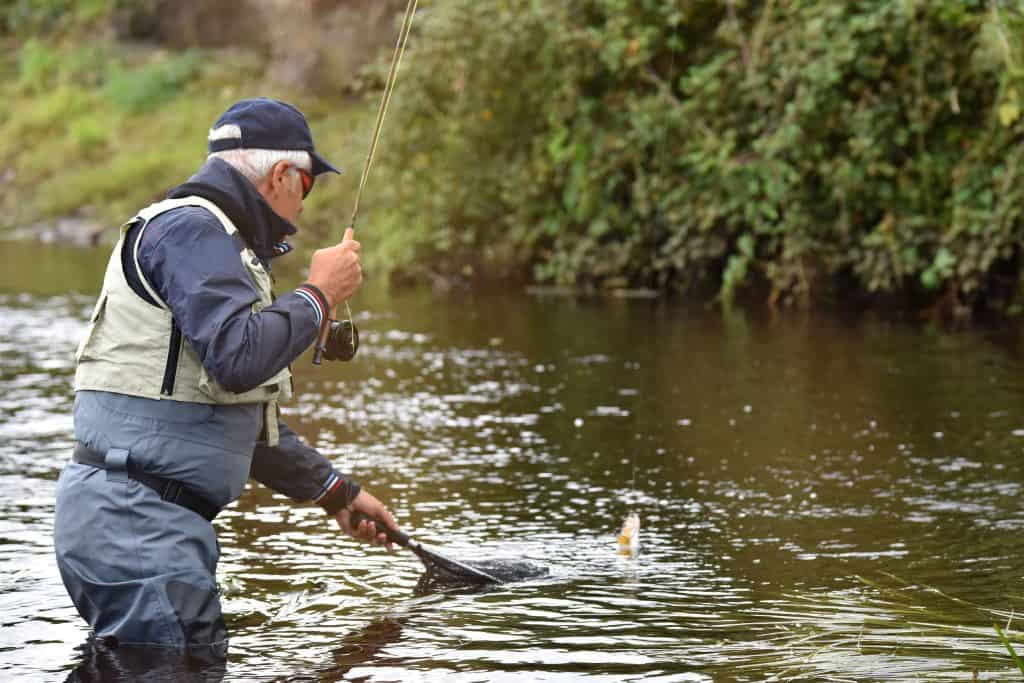
When fishing in clearer weather, we attempt to make our lines seem as natural as possible with small delicate movements (especially when fly fishing). We do this to coerce even the calmest of fish to take our line.
As the rain falls, these calmer fish become more aggressive and there is not as much of a need to fish with the delicate motions. If you cast and there is not a relatively quick bite, chances are there is not going to be one on that cast.
So do not waste your time. Cast again and fish faster!
#3 Check the Runoffs
Even light rain can create runoff into the main body of water where you are fishing. Especially if the rain is coming down hard, you will want to direct your attention to these areas.
These runoffs contain new plants, worms, and other nutrients that will attract the smaller bait fish (and in turn the bigger fish hoping to eat the smaller bait fish).
Runoff carries plants and nutrients that fish want to eat.
Focusing your casts to these areas can greatly increase your chances of landing a big fish.
#4 Get Good Rain Gear
Fishing in the rain can be fun and effective, however not being properly dressed or prepared can ruin even the greatest of fishing trips.
While I already discussed the importance of having rain gear and warm clothes above, I am going to STRESS the fact that you are using effective gear.
Thin rain ponchos can get in the way while casting and often will let water in when you stop focusing on staying dry and start focusing on catching fish.
#5 Seek Out Clear Water (where possible)
One of the added challenges of fishing in the rain is that the rain stirs up sediment in the water lowering your ability to see and recognize signs of fish. For river fishermen, this tip applies more to lake fishing since the rushing movement of a river already stirs up sediment.
While you can continue fishing in the murky waters, the low visibility is going to greatly limit your chances of being able to locate and catch a fish.
If possible move to where the water is clearer and you can get a better read on the fish. This may be harder to do depending on how long the rain has been falling for.
Try to move away from any springs or streams that may be stirring up extra sediment and find a sheltered area of the water where you can have greater visibility.
#6 Fish With the Wind
Following the wind also applies more to lake fishing so if you primarily go fishing on a river or stream, feel free to skim or skip this section (do not worry I will not be offended).
Since rain causes the fish to move from their normal spots, locating fish in the middle of the falling rain may pose a greater difficulty than one normally would have.
A great way to locate the larger fish is to find the bait fish. Earlier we talked about how the baitfish seek the nutrients that the rain is introducing into the water; however, these smaller baitfish also get pushed around in the water’s changing currents.
As the wind changes the currents of the water, the baitfish will either be pushed downwind, or they will seek cover in coves, or at the end of any points.
Baitfish tend to get pushed downstream by the new currents.
Find where the baitfish are by following the wind, and you might just land a larger fish!
#7 Consider the Water Temperature
The oncoming rain will change the temperature of the water sending the fish searching for somewhere warmer.
Rain will not cause as much change to the deeper water’s temperature as it does to the surface’s.
While the pouring rain and wind will change the surface temperature, the falling rain has less of an effect on the deeper waters.
If fishing seems scarce towards the top of the water due to colder temperatures, try fishing a little deeper.
#8 Find Your Best Pattern Quickly
As soon as the weather begins changing, so does the fishes’ behavior.
Fish may move from regular feeding grounds or retreat deeper into the water. Once the weather changes, try some of the tips we have listed above until you find the one that works best for you.
Remember once the weather begins changing again, the fish will begin moving and changing their behavior as well. So, once you do find a pattern that works for you, stick with it. You never know how long your pattern will last.
Remember Safety!!!
Sticking it out through a rainstorm can make for some of the best fishing you have ever seen, but you should always remain cautious and be thinking of safety.
As a fisherman, you should know how to put the importance of your safety above your goal of catching a fish. Safety should always be of utmost importance.
Related Questions:
Do fish hide in the murkier waters of runoffs during a rainstorm? While the smaller baitfish do enjoy eating the newfound nutrients from runoffs, if the water becomes too murky they will not spend long there. When the sediment becomes too heavy in the water fish may choose to move elsewhere. This is due to the fact that the sediment can clog the fishes’ gills.
Is saltwater fishing also good in the rain? Saltwater fishing has more challenges because a boat is necessary. You should not only following the normal water safety tips but the boating safety tips as well. If the wind is following the same direction as the tide, then conditions should be great for a successful fishing trip.
Is fishing for trout better after it rains? Like other fish, new rainfall encourages bigger trout to begin feeding. The more the fish are feeding (and the faster they do so) increases your chances that one will take your line. Since rain causes trout to feed more and to feed faster, fishing for trout can definitely be better after it rains.
